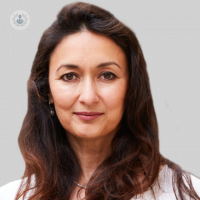Understanding cataracts: Aging, surgery, and what to expect
Written in association with:In her latest online article, Miss Rahila Zakir gives us her insights into cataracts. She talks about the natural aging process, the progression of age-related changes, the emergence of cataracts, if cataract surgery is a necessity, special circumstances, drivers and cataract surgery and post-surgery expectations.

Cataracts: The natural aging process
A cataract represents the culmination of the eye's natural aging process, specifically impacting the lens. In our youth, the lens is transparent and highly adaptable, enabling us to adjust our focus for both near and distant objects with ease, whether it's reading a book or using smartphones and tablets.
The progression of age-related changes
As time passes, the lens undergoes a transformation, losing some of its flexibility. Although distant vision remains relatively clear, near vision gradually deteriorates, a condition known as presbyopia. This necessitates the use of reading glasses to facilitate up-close tasks. Over time, the prescription for reading glasses typically strengthens, but the lens remains transparent during this phase. However, a few years down the road, the lens starts to thicken, affecting both near and distant vision. Many individuals who never needed vision correction for activities like driving or watching television suddenly find themselves requiring glasses for both near and distant vision, such as bifocals or varifocals. Despite the need for glasses, vision remains relatively clear during this stage.
The emergence of cataracts
Ultimately, the lens becomes discoloured and opaque, marking the onset of cataracts. At this point, vision becomes dull and hazy, and the effectiveness of glasses diminishes. Tasks like seeing in dim lighting become increasingly challenging. Your optometrist might then recommend cataract surgery as the best solution to restore clear vision.
Is cataract surgery a necessity?
It's essential to note that having cataracts doesn't automatically necessitate surgery. If your vision remains satisfactory for your daily needs, you can postpone surgery until your vision becomes notably impaired. Signs that it might be time for surgery include increasingly hazy or dull vision, difficulty with low-light situations, trouble recognizing distant objects like bus numbers or road signs, or struggling with night driving. Some cataracts can also cause substantial glare from oncoming headlights. If you've experienced a recent fall or stumble, it's crucial to investigate whether cataracts might be contributing to the problem. Even if only one eye is affected, you may choose to rely on your better eye for an extended period, unless the cataract is significantly advanced and results in severe vision loss. Your optometrist will assist you in making an informed decision based on your eye examination.
Cataract surgery for special circumstances
In certain situations, cataract surgery may be recommended. For instance, if you have a retinal condition that threatens your eyesight, but the cataract obstructs the ability to monitor the retina, your doctor may suggest cataract surgery to ensure proper care.
Drivers and cataract surgery
If you're a driver and your vision no longer meet the DVLA standards for driving, cataract surgery might be necessary to maintain your driving privileges. In less severe cases, you can initially consult with your optometrist, as an updated prescription for glasses or contact lenses could temporarily improve your vision to meet driving standards. However, regular checks are required to ensure your vision remains legal for driving. The DVLA standard typically entails the ability to read a number plate produced after 2001 from a distance of 20 meters in daylight while wearing glasses or contact lenses. Additionally, your visual acuity should be 6/12 or better, and you must have an adequate field of vision.
Post-cataract surgery expectations
After cataract surgery, you can anticipate several positive changes in your vision. Your sight will generally become brighter, crisper, and clearer, with improved colour perception. In many cases, you may choose a lens implant that provides clear, unaided distance vision, reducing your reliance on glasses or contact lenses for distant tasks. Depending on your chosen outcome, a lens implant can also correct for both near and distant vision, reducing the need for corrective eyewear.
Miss Rahila Zakir is a distinguished ophthalmologist and lifestyle medicine physician. You can book an appointment with Miss Zakir on her Top Doctors profile.



